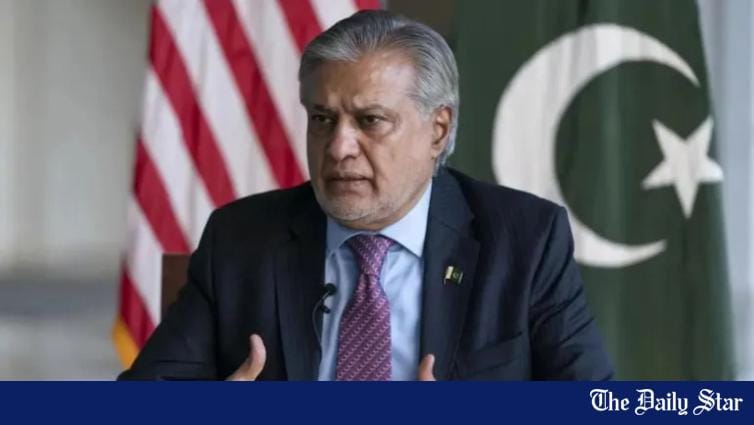Saif
Senior Member
- Joined
- Jan 24, 2024
- Messages
- 15,940
- Likes
- 7,996
- Nation

- Axis Group


Trump says he hopes India and Pakistan stop now after going 'tit-for-tat'
President Donald Trump said on Wednesday Washington's partner India and US ally Pakistan have "gone tit-for-tat," and that he hoped the two nuclear-armed Asian neighbours could stop further escalations. US Secretary of State Marco Rubio separately discussed efforts to de-escalate tensions between
Trump says he hopes India and Pakistan stop now after going 'tit-for-tat'
REUTERS
Published :
May 08, 2025 10:45
Updated :
May 08, 2025 10:45

US President Donald Trump speaks during a swearing-in ceremony for the new US ambassador to China, former US Senator David Perdue, at the White House in Washington, DC, US, May 7, 2025. REUTERS/Leah Millis
President Donald Trump said on Wednesday Washington's partner India and US ally Pakistan have "gone tit-for-tat," and that he hoped the two nuclear-armed Asian neighbours could stop further escalations.
US Secretary of State Marco Rubio separately discussed efforts to de-escalate tensions between India and Pakistan with his Saudi Arabian counterpart in a Wednesday call, the State Department said.
KEY QUOTES
"They've gone tit-for-tat, so hopefully they can stop now," Trump said at the White House on Wednesday, adding he knew both sides "very well" and wanted "to see them work it out."
He added: "And if I can do anything to help, I will be there."
Trump has termed the rising tensions a shame.
WHY IT'S IMPORTANT
India hit Pakistan and Pakistan-administered Kashmir with missiles on Wednesday and Pakistan said it shot down some Indian aircraft and vowed to retaliate, in their worst clash in over two decades.
India is an important US partner for Washington, which aims to counter China's rising influence, while Pakistan remains an ally despite its diminished importance after Washington's withdrawal from neighboring Afghanistan in 2021.
US TALKS
In recent days, Washington has been in touch with both nations. Rubio has held calls with both, including after India's Wednesday strikes.
CONTEXT
India said it struck "terrorist infrastructure" sites, some linked to an Apr 22 attack by Islamist militants who killed 26 people in India-administered Kashmir. India blamed April's attack on Pakistan, which dismissed the accusations and called for a neutral probe. Washington expressed support for India at the time but did not directly criticize Pakistan.
Pakistan said over 30 people were killed in India's strikes on Wednesday.
Analysts say US involvement to achieve diplomatic goals in Russia's war in Ukraine and Israel's war in Gaza may make Washington leave India and Pakistan on their own in the early days of the tensions.
REUTERS
Published :
May 08, 2025 10:45
Updated :
May 08, 2025 10:45
US President Donald Trump speaks during a swearing-in ceremony for the new US ambassador to China, former US Senator David Perdue, at the White House in Washington, DC, US, May 7, 2025. REUTERS/Leah Millis
President Donald Trump said on Wednesday Washington's partner India and US ally Pakistan have "gone tit-for-tat," and that he hoped the two nuclear-armed Asian neighbours could stop further escalations.
US Secretary of State Marco Rubio separately discussed efforts to de-escalate tensions between India and Pakistan with his Saudi Arabian counterpart in a Wednesday call, the State Department said.
KEY QUOTES
"They've gone tit-for-tat, so hopefully they can stop now," Trump said at the White House on Wednesday, adding he knew both sides "very well" and wanted "to see them work it out."
He added: "And if I can do anything to help, I will be there."
Trump has termed the rising tensions a shame.
WHY IT'S IMPORTANT
India hit Pakistan and Pakistan-administered Kashmir with missiles on Wednesday and Pakistan said it shot down some Indian aircraft and vowed to retaliate, in their worst clash in over two decades.
India is an important US partner for Washington, which aims to counter China's rising influence, while Pakistan remains an ally despite its diminished importance after Washington's withdrawal from neighboring Afghanistan in 2021.
US TALKS
In recent days, Washington has been in touch with both nations. Rubio has held calls with both, including after India's Wednesday strikes.
CONTEXT
India said it struck "terrorist infrastructure" sites, some linked to an Apr 22 attack by Islamist militants who killed 26 people in India-administered Kashmir. India blamed April's attack on Pakistan, which dismissed the accusations and called for a neutral probe. Washington expressed support for India at the time but did not directly criticize Pakistan.
Pakistan said over 30 people were killed in India's strikes on Wednesday.
Analysts say US involvement to achieve diplomatic goals in Russia's war in Ukraine and Israel's war in Gaza may make Washington leave India and Pakistan on their own in the early days of the tensions.










































